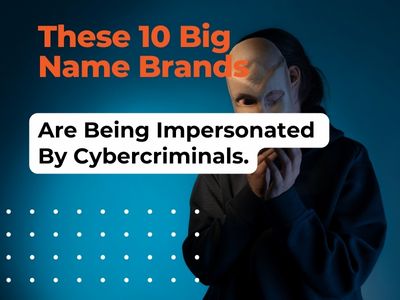10 Well-Known Brands Exploited by Scammers to Deceptively Obtain Your Confidential Data
4 Sept 202310 Well-Known Brands Exploited by Scammers to Deceptively Obtain Your Confidential Data
Cybercriminals are well aware that one of the most effective ways to infiltrate your defenses is by impersonating trusted brands you're familiar with. These major corporations have spent years cultivating their brand image through marketing, customer service, and consistency to establish a sense of trustworthiness. Hackers capitalize on this reputation to target you.
Phishing attacks are the prevailing method used. These cybercriminals create URLs that strikingly resemble the legitimate websites of these companies. To evade your watchful eye, here are some subtle changes hackers employ that often escape notice:
- Substituting a zero for the letter "O," or replacing a capital "I" with a lowercase "L." In a hurried glance at an email, these alterations might appear genuine.
- Incorporating a word that seems like it could be a subdomain of the actual company, such as "info@googleservice.com."
- Utilizing a distinct domain extension, like "info@google.io."
In certain instances, these criminals go even further by crafting a webpage identical to the genuine website. When you click on a link – whether via email, SMS, or even social media – various perilous outcomes may transpire.
Firstly, malware could be implanted on your device. Clicking on a malicious link could initiate an automatic malware download, containing harmful files capable of extracting personally identifiable information from your device, including usernames, credit card or bank account details, and more.
Secondly, the counterfeit website may feature a form aimed at harvesting your information. This could include login credentials, passwords, and, in some instances, credit or bank information.
Thirdly, an open redirect may occur. Despite a seemingly legitimate link, clicking on it could lead to a malicious website designed to steal your information.
Which brand impersonations should you be vigilant about? All of them, but according to the latest Brand Phishing Report from Check Point, there are 10 companies that consistently appear in brand phishing attempts:
Here are the top 10 most frequently mimicked brands in Q2 of 2023:
- Microsoft (29%)
- Google (19.5%)
- Apple (5.2%)
- Wells Fargo (4.2%)
- Amazon (4%)
- Walmart (3.9%)
- Roblox (3.8%)
- LinkedIn (3%)
- Home Depot (2.5%)
- Facebook (2.1%)
Reflect on how many of these companies routinely send you email communications. Even just one could place you in a vulnerable position.
Cybercriminals take these scams to the next level, customizing messages that align with each brand to capture your attention.
Here are three common phishing attack tactics these cybercriminals employ under the guise of these reputable brands to gain access to your private information:
- Unusual Activity – Emails of this nature suggest that unauthorized access to your account has occurred and prompt you to change your password urgently. Exploiting fear, these emails often contain buttons like "Review Recent Activity" or "Click Here to Change Your Password." Some emails might even display fabricated login details, including region, IP address, and sign-in time, closely resembling legitimate communications to deceive you into clicking.
- Fake Gift Cards – These emails imply you've received an e-gift card. Upon opening the email, you're redirected to a site to "claim your gift card" or are presented with a button to "redeem now."
- Account Verification Required – These emails assert that your account has been disconnected and insist on you verifying your information. The moment you enter your login credentials, the hacker gains access.
These scams occur daily. You and your unsuspecting colleagues are targets. Without proper training, they may not recognize the signs, panic, and try to address these "issues" discreetly, inadvertently exacerbating the problem.
Securing your network involves several steps. One approach is implementing email monitoring to minimize the chances of phishing emails infiltrating your inbox. Equally essential is ensuring that employees are educated about spotting phishing attempts. Even if a phishing email bypasses detection systems, well-informed employees can still safeguard your company.
Initiate your cybersecurity defense with a FREE Cybersecurity Risk Assessment. We'll evaluate your network, furnishing a comprehensive report on vulnerabilities and recommended solutions. No obligation, but understanding your risk is paramount. Schedule your assessment here.





08 8922 0000